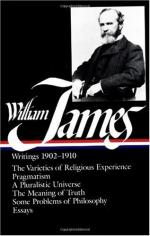|
This section contains 875 words (approx. 3 pages at 400 words per page) |

|
Subjective Experience.
One of William James major critiques of philosophy and general thought at the time is that their approach is too mechanistic. The thinkers seem to put too much reliance on the external 'objective' and measurable world and to derive all sense of 'truth' from measuring this world. James feels that subjective experience is just as important and that, therefore, any measure of truth has to necessarily contain the conversation between a person's inner experience and the outer experience.
James first tackles this idea in The Varieties of Religious Experience in which he suggests that the majority of evidence for the divine exists in individual experience. He then suggests it is exactly personal experience of the divine that can often cause people to change in meaningful positive ways, which then inform how they interact objectively with the rest of the world. James implies that conversion is almost entirely...
|
This section contains 875 words (approx. 3 pages at 400 words per page) |

|




